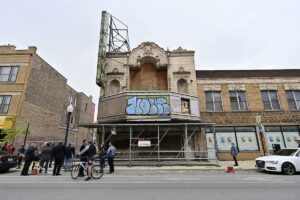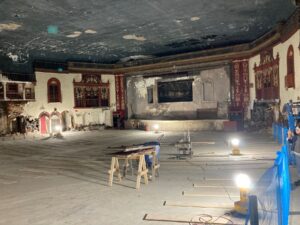Adaptive reuse project turns 1929 cinema into live performance venue, adds brewery and taproom, revives Ramova Grill in Chicago’s Bridgeport neighborhood
McHugh Construction, one of the Midwest’s largest commercial contractors, announces it has completed the $30 million adaptive reuse transformation of Chicago’s historic Ramova Theatre from a long-shuttered single-screen cinema to an 1,800-person concert hall in Chicago’s Bridgeport neighborhood. As part of the 36,000-square-foot project at 3510-3520 S. Halsted St., McHugh also built out space for Other Half Brewing, an independent craft brewery and taproom; Ramova Grill, an 18-seat diner; and Ramova Loft, a second-floor 200-person event venue.
Ramova Theatre originally opened at the tail end of the Roaring Twenties and quickly became the jewel of the Bridgeport neighborhood with its neon red marquee and Spanish-inspired architecture. However, decades later ticket sales slowed, leading to Ramova’s closure in 1985. After sitting dormant for nearly 40 years, Ramova’s historical and artistic significance was officially recognized with its addition to the National Register of Historic Places in 2021; the same year McHugh embarked on the building’s restoration.
“When we first arrived on the site, it was like a time capsule, with the ticket booth still in place – even with the same curtains from the day it closed,” said Andrew Totten, vice president of McHugh Construction. “But it was in such a state of disrepair after years of neglect. Severe water damage destroyed large areas of the plaster ceiling, and the terracotta façade on Halsted Street was missing several parts.
“It was the exact type of complicated project our experienced restoration team loves to bring back to life,” he added. “McHugh has been around longer than the Ramova Theatre, so we knew exactly how and when to preserve, protect, rebuild and start anew, like when we took casts of the building’s remaining terracotta pieces and had them remade. We were honored to return the building to its 1929 glory and create a magical experience for the community once again.”
For more than two years, McHugh Construction worked closely with project architect O’Riley Office, Baum Revision and historic preservation specialists to meticulously restore the ornate architectural details in Ramova’s original Spanish courtyard-style lobby and auditorium.
Revived are the pale-yellow stucco-style walls, red-notched archways and columns, decorative bronze wrought-iron faux windows and balconies, a clay-tile roof line and a ceiling painted midnight blue – all evoking the beautiful and inviting hacienda ambiance, just like the day Ramova opened in 1929.
Gone are the velvety movie theater seats. In their place is a 22,000-square-foot barrier-free multi-level concrete floor in front of an expansive stage. While rows of spotlights hang from the ceiling, casting multi-colored glows throughout the concert hall, the venue’s new speaker system amplifies the onstage vocals and instruments, connecting artists with the audience. Multiple bars were installed in the back of the auditorium and a second-floor balcony was revived to offer clear views of the stage.
“The South Side of Chicago is home to the majority of local artists, but it has had the least amount of high-quality space for them to perform and hone their craft – from an aesthetic as well as acoustic point of view,” said Tyler Nevius, Ramova’s developer. “The city needed this and the South Side needed this.”
With an eye to attracting big-name performers, Ramova’s new greenroom is worthy of any A-lister, with four separate suites – each with full baths – and an office for tour managers to conduct business, noted Nevius. To protect artists from paparazzi and unauthorized personnel, McHugh created direct paths for touring vehicles to arrive, unload equipment and privately access the greenroom and performance area.
“Andy [Totten] and I talked with quite a few artists as part of the process,” Neviums said. “First and foremost, we wanted to create a place where they would want to come and perform. One that looks great, sounds even better and where people can enjoy a show in comfort, which meant a five-star air conditioning system.”
That required McHugh and its subcontractor teams to draw on decades of historic restoration experience to conceal state-of-the-art HVAC, electrical, sound and fire protection systems within the early 20th century fabric of the theater building. McHugh also tapped its in-house structural engineering team, McHugh Engineering Group, for expertise on structural modifications and additions to historic and complex structures.
“Having McHugh and its breadth of experience has been unbelievable,” Nevius said. “Multiple times we went to the McHugh office and worked on the whiteboard to understand how to fit everything into the venue. It was incredibly tight to shoehorn everything in while remembering what’s essential. For instance, it’s very important for the audience to have immediate and clear access to the bars and bathrooms.”
Hiring locals on the project was also a priority. “It was important to us to have our teams reflect the community we’re a part of,” Nevius said. “We began working with McHugh because we wanted to have local contractors and diversity on the jobsite, which can be hard to do in a city like Chicago where there is so much development going on so there’s competition for labor, but McHugh made it possible. We had a tremendous number of workers that live in area.”
Staying true to its mission as a neighborhood gathering place, Ramova Loft, the 200-person venue on the second floor above the brewery and taproom, offers space for smaller performances by up-and-coming artists as well as events for local schools and community groups. The parking lot across the street from the building can also be used for community events such as farmers markets, and the empty lot adjacent to the south side of Ramova has been reimagined as a new outdoor beer garden.
“It’s rewarding to see all the dynamic uses come together at this one location to create an authentic community anchor,” Totten said. “I’m grateful for the skilled construction professionals I worked with to address every challenge of the existing conditions of the building to keep this high-profile, much-anticipated project on track.”
The renovated Ramova Theatre grand opened on Dec. 31, 2023, with a 1920s-themed live performance of music and dancing to ring in the new year. The glitzy marquee once again lit up Halsted and 35th streets, and the auditorium’s atmosphere transplanted revelers to a grand Andalusian patio.
The adaptive reuse project was funded by investments from the local populace, tax-increment financing subsidies from the city of Chicago, a state grant, and a Historic Places loan. McHugh drew on its years of experience in Chicago public-private projects, such as 43 Green and 508 Pershing at Oakwood Shores in Bronzeville as well as Ogden Commons in Douglas Park, to ensure the renovation’s success for all parties.
About McHugh Construction:
Since its founding in 1897, James McHugh Construction Co. has earned its reputation as a builder of landmark, one-of-a-kind structures in Chicago and other areas of the country. The company specializes in managing multimillion-dollar projects, from ground-up new construction to complex renovations and high-end interiors. As a multi-faceted general contractor, McHugh constructs high-rise concrete towers; steel structures; and buildings using alternative materials such as cold-formed steel, heavy timber and cross-laminated timber. McHugh has built and renovated iconic structures such as Chicago’s Marina City, Vista Tower, Trump Tower, Aqua Tower, Blackstone Hotel, Navy Pier (including the 200-foot-tall Centennial Wheel and most recently, the Sable Hotel at Navy Pier, Curio Collection by Hilton, and the Offshore Rooftop and Bar), as well as other noteworthy projects in regional markets such as Loring Park Tower in Minneapolis, Two Twelve Clayton and Westin Cupples Station in the St. Louis area, and multiple projects in Nashville and Miami. The company’s mission has always been to promote a seamless and positive project experience with excellence and innovation. It is known for its unwavering commitment to its clients, its ability to deliver exceptional results on time and within budget, and its dedication to growing and developing its partnerships with subcontractors. For more information on the company, visit www.mchughconstruction.com.
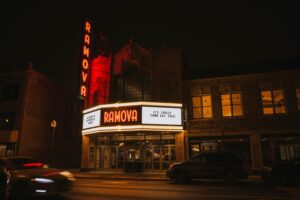
Ramova Theatre Marquee: McHugh Construction restored Ramova Theatre’s neon red Marquee in adherence to National Register of Historic Places standards so it lights up Halsted and 35th streets on Chicago’s South Side just like it did in 1929. (Photo credit: Clayton Hauck)
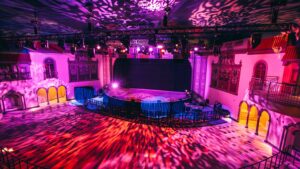
Ramova Theatre Concert Hall: McHugh Construction has completed the $30 million restoration of Chicago’s historic Ramova Theatre from a long-shuttered cinema to an 1,8000-person concert hall, creating a new community anchor in the Bridgeport neighborhood. (Photo credit: Clayton Hauck)
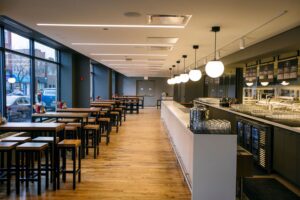
Ramova Theatre Taproom: As part of the 36,000-square-foot project at 3510-3520 S. Halsted St. in Chicago, McHugh Construction built out space for Other Half Brewing, an independent craft brewery and taproom. (Photo credit: Clayton Hauck)
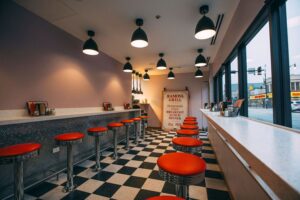
Ramova Grill: McHugh Construction revived Ramova Grill, an 18-seat diner at 3520 S. Halsted St. adjacent to Ramova Theatre that closed in 2012 after 82 years. (Photo credit: Clayton Hauck)
